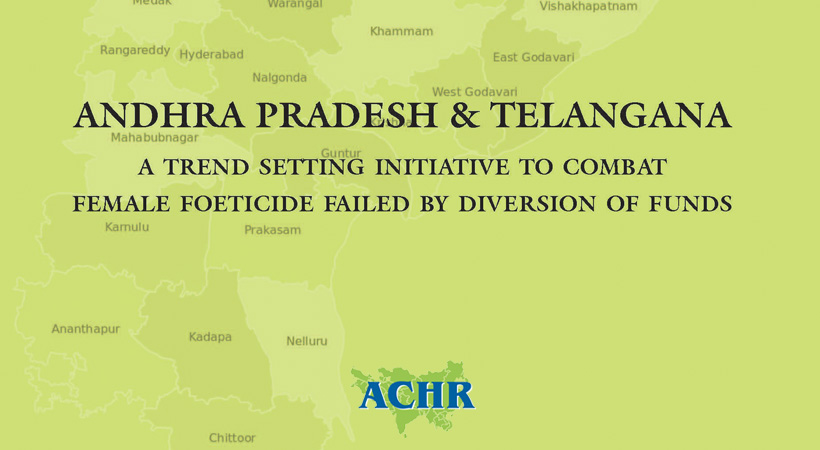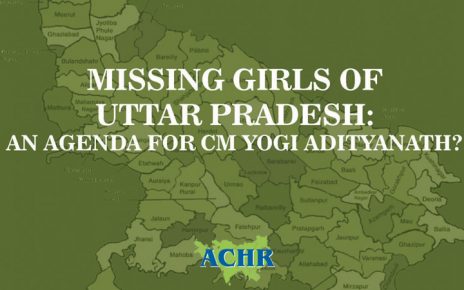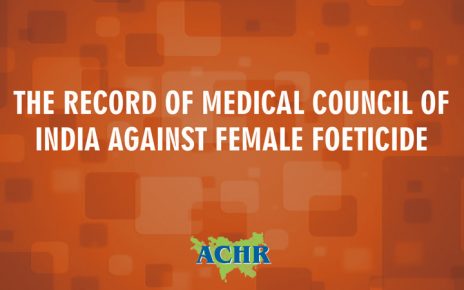India is infamous for female foeticide and female infanticide, the crudest forms of gender based violence. The Child Sex Ratio (CSR) defined as the number of females per 1000 males in the age group 0-6 years had come down alarmingly to 939 as per 2011 census from 961 in 2001 in undivied Andhra Pradesh indicating the continuing preference for boys. Though it is better than the national average of 919, in rural areas all the 23 districts registered declining child sex ratio. The lowest child sex ratio was Hyderabad district (914).
According to the National Crime Records Bureau in the last 15 years from 2001 to 2015, 30 cases of feticide were registered in Andhra Pradesh.
The implementation of the Preconception and Pre-Natal Diagnostic Techniques (Prohibition of Sex Selection) Act of 1994 (PC&PNDT Act ) remains in shambles. The Comptroller and Auditor General of India (CAG) in its 2015 report stated that “due to non-convening meetings at regular intervals, the Board/authority/advisory committee under the PC&PNDT Act could not review the implementation activities, enforce prescribed standards, investigate complaints and advise appropriate authorities with regard to the provisions of the Act”. Since the inception of the PC&PNDT Act in 1994, not a single conviction was secured in Andhra Pradesh. The 10th Report of the Common Review Mission of the of the National Health Mission (NHM) released in June 2017 with respect to implementation of the PC&PNDT Act
stated that “Various Committees required to be set up under PC-PNDT Act have been set up and provisions of the Act are being implemented. There are 19 ongoing court cases under the Act. Lack of evidence and out of court settlement has been the main reasons for dismissal of cases”.
There is serious under-reporting under the Medical Termination of Pregnancy Act (MTP) of 1971. For example, Assam with a total population of 31 million as per 2011 census reported a total of 3,53,309 cases of termination of pregnancies under the MTP Act during 2008-2009 to 2012-13. Andhra Pradesh with over 84 million populations reported only 32,842 cases.
The New Girl Child Protection Scheme (NGCPS) launched in April 2005 for eliminating gender discrimination, eradicating female infanticide, improving sex ratio to empower and protect the rights of girl children and women through direct investment from the Government has not been effective. The scheme provides for risk coverage for life insurance for the girl child commencing from the age of 3 years. A single girl child is entitled to receive Rs.1 lakh after completion of 20 years of age and in case of two girl children, both of them are entitled to receive Rs. 30,000 each after completion of 20 years of age. Project Director is the nodal officer of the scheme in the district.
During the last one decade i.e. FY 2005-2006 to 2014-2015 the total number of beneficiaries were 6,65,320 under the NGCPS. The Comptroller and Auditor General of India (CAG) in its 2015 report stated that official records do not reveal break-up of category of beneficiaries with the prescribe a ratio of 15 per cent for Scheduled Castes (SCs), 6 per cent for Scheduled Tribes (STs) and remaining to others for extending the benefits. There were discrepancies in processing/disbursement of claims. For example, claims amounting to Rs. 85.94 lakh settled by Life Insurance Corporation and paid to the Commissioner, Women Development and Child Welfare (WD&CW) for disbursement to the nominees of the insured parents were lying with the latter as of July 2014 without disbursement. Indeed, against 142 claims proposed by Project Directors (PDs), 106 claims were settled by LIC and 34 claims were returned to PDs for want of information. The remaining claims were not paid due to non-availability of bank details. The CAG also highlighted non-issuance of bonds by LIC due to lack of coordination between the Department of Women and Child Welfare and LIC. The CAG audit found that in the test checked districts, 1,01,700 applications were received during 2009-2014 of which, only 49,313 (48 per cent) bonds were issued leaving a balance of 52,387 bonds yet to be issued as of July 2014. Bonds were not issued at all during the years 2011-12 and 2012-13.
The Andhra Pradesh Government enacted the Andhra Pradesh Bangaru Talli Girl Child Promotion and Empowerment Act, 2013 providing financial incentives on achieving certain milestones in the life of girl children born in the State on or after 1st May 2013 till they attain their 21st year. This is one of the most innovative legal initiatives for empowerment of the Girl Child in the country.
However, the CAG in its performance audit found that the Government of Andhra Pradesh allocated Rs. 80.30 crores through supplementary provision in the budget during FY 2013-2014. Out of this, an amount of Rs. 79.19 crore was drawn and adjusted to the Public Deposit (PD) accounts of both components of the Bangaru Talli Scheme – Society for Elimination of Rural Poverty (SERP) and Mission for Elimination of Poverty in Municipal Areas (MEPMA). However, only an amount of Rs. 39.51 crore was utilized covering 1,58,059 beneficiaries (57 per cent) as against 2,75,674 registered beneficiaries. The implementing agency, SERP, diverted an amount of Rs.1.42 crore towards administrative expenses (SPMU) which was not authorised as per the scheme guidelines.
The audit further found that there was a balance of Rs. 41.30 crore (SERP: PD Account – Rs. 21.20 crore, Current Account Rs. 7.75 crore and MEPMA-PD Account Rs.12.35 crore) as of April 2014. It was found that utilization certificates (UCs) were not furnished by MEPM A till the time of the audit. The UC furnished by SERP for the period March 2014 for Rs. 42.17 crore as against the actual expenditure of Rs. 20.33 crore in respect of 81,309 beneficiaries was found to be incorrect. It was further found that the Commissioner, WD & CWD was furnishing the UCs for the entire amounts released to SERP and MEPMA instead of for the actual utilisation. In respect of the releases (Rs.14.53 crore) to MEPMA, the details of beneficiaries, district-wise registrations, expenditure, UCs, etc were not available with the Commissioner, WD & WCD.
A trend setting initiative, Andhra Pradesh Bangaru Talli Girl Child Promotion and Empowerment Act of 2013, to empower girl child has failed because of the diversion of the funds by the authorities who were not interested to implement the project.
In order to address the continuous decline in CSR and to address the scourge of female foeticide in Andhra Pradesh the Asian Centre for Human Rights recommends the following to the State Government of Andhra Pradesh:
- Implement the Andhra Pradesh Bangaru Talli Girl Child Promotion and Empowerment Act of 2013 in letter and spirit;
- Ensure that all the 2,75,674 registered beneficiaries are covered and adequate resources are allocated by the State Government considering the diversion of funds already sanctioned.
- Issue instructions to ensure that funds allocated under the Andhra Pradesh Bangaru Talli Girl Child Promotion and Empowerment Act of 2013 are not diverted;
PC&PNDT Act
- Establish PC&PNDT Bureau of Investigation staffed by the State Police under the Department of Health and Family Welfare to assist the appropriate authorities for effective implementation of the PC&PNDT Act;
- Launch a Mukhbir Yojana to reward those providing information with amount of rewards of at least Rs 200,000 to decoys andMukhbirs along with (i) specific incentive in the form of bond/scheme for the unborn baby of the decoy customer apart from undertaking of not aborting the foetus under any circumstances; (ii) specific allowance to the decoys and Mukhbirs to attend each hearing during the trials; (iii) ensure anonymity of the complainants, informers etc to the extent possible; and (iv) sanction adequate financial resources for implementation of the scheme in all the States and UTs;
- Introduce Integrated Monitoring System and installing tracking devices in all sonography machines for implementation of the PC&PNDT Act;
- Ensure proper implementation of the PC&PNDT Act inter alia through: (a) ensuring efficient and effective system of registration of all ultrasound/ genetic clinics so as to ensure compliance with the provisions of the Act; (b) ensuring regular and effective inspection of the ultrasound/ genetic clinics for curbing the violation of Act & Rule; and (c) ensuring proper enforcement mechanism and taking appropriate action for violations of the provisions of Act.
- Ensure proper implementation of the PC&PNDT Act, inter alia, by (i) reconstituting or appointing members of the statutory bodies of the PCPNDT Act such as State Supervisory Board, State Advisory Committee and State Inspection and Monitoring Committee of the PC&PNDT Act on time; (ii) ensuring strict implementation of decisions adopted by these by the statutory bodies at the District level; (iii) ensuring review of implementation of previous resolutions or decisions in subsequent meetings by the statutory bodies at the state level;
- Ensure time bound trial of the cases under the PC&PNDT Act; and
- Make necessary budgetary allocations for implementation of all these measures.




